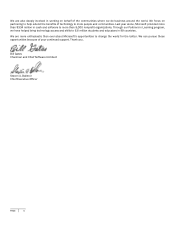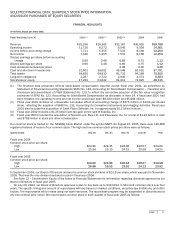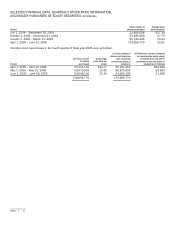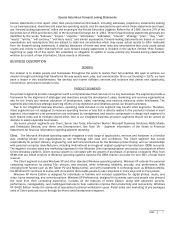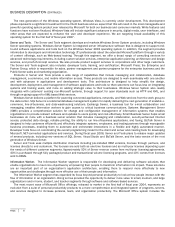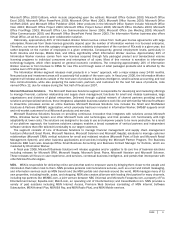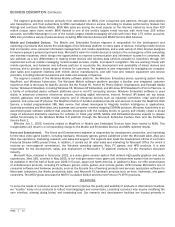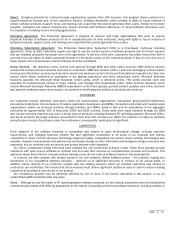Microsoft 2005 Annual Report Download - page 15
Download and view the complete annual report
Please find page 15 of the 2005 Microsoft annual report below. You can navigate through the pages in the report by either clicking on the pages listed below, or by using the keyword search tool below to find specific information within the annual report.
BUSINESS DESCRIPTION (CONTINUED)
PAGE 14
Unix, are supplied by competitors such as IBM, Hewlett-Packard, Apple Computer, Sun Microsystems and others, which are
vertically integrated in both software development and hardware manufacturing and have developed operating systems that
they preinstall on their own computers. Personal computer OEMs who preinstall third-party operating systems may also license
these firms’ operating systems. The Linux operating system, which is also derived from Unix and is available without payment
under a General Public License, has gained increasing acceptance as competitive pressures lead personal computer OEMs to
reduce costs. The Microsoft Windows operating systems also face competition from alternative platforms and new devices that
may reduce consumer demand for traditional personal computers. Competitors such as Mozilla offer software that competes
with the Internet Explorer Web browsing capabilities of our Windows operating system products. Apple Computer, Real
Networks, and many others compete with the media playback capabilities (Windows Media Player) of our Windows operating
system products. We believe current and future versions of these and other aspects of Windows will continue to compete
effectively with non-Microsoft browsers, media players, and other non-Microsoft programs on important attributes such as
features, functionality, and security. We believe our operating system products compete effectively by delivering innovative
software, an easy-to-use interface, compatibility with a broad range of hardware and software applications, and the largest
support network for any operating system.
Server and Tools. Our server operating system products face intense competition from a wide variety of competing server
operating systems and server applications, offered by firms with a variety of market approaches. Vertically integrated computer
manufacturers such as IBM, Hewlett-Packard, Sun Microsystems and others offer their own variant of Unix preinstalled on
server hardware, and nearly all computer manufacturers offer server hardware for the Linux operating system. IBM’s
endorsement of Linux has accelerated its acceptance as an alternative to both traditional Unix and Windows server operating
systems. Linux’s competitive position has also benefited from the large number of compatible applications now produced by
many leading commercial software developers and non-commercial software developers. A number of companies supply
versions of Linux, including Novell and Red Hat.
We compete in the business of providing enterprise-wide computing solutions with several companies that provide competing
solutions and middleware technology platforms. IBM and Sun Microsystems lead a group of companies focused on the Java 2
Platform Enterprise Edition (J2EE). Commercial software developers that provide competing server applications for PC-based
distributed client/server environments include Oracle, IBM, and Computer Associates.
Numerous commercial software vendors offer competing commercial software applications for connectivity (both Internet
and intranet), security, hosting, and e-business servers. In addition, IBM has a large installed base of Lotus Notes and cc:Mail,
both of which compete with our collaboration and e-mail products. There are also a significant number of non-commercial
software products that compete with our solutions, including the widely-deployed Apache Web Server.
Our products for software developers compete against offerings from BEA Systems, Borland, IBM, Macromedia, Oracle, Sun
Microsystems, and other companies.
We believe that our server products provide customers with significant advantages in innovation, performance, total costs of
ownership, productivity, applications development tools and environment, compatibility with a broad base of hardware and
software applications, security, and manageability.
Information Worker. While we are the leader in business and personal productivity software applications for personal
computers, competitors to the Microsoft Office System include many software application vendors such as Apple, Corel, IBM,
Oracle, Sun Microsystems, Novell, Red Hat, and local application developers in Europe and Asia. IBM (Smartsuite) and Corel
(WordPerfect Suite) have significant installed bases with their office productivity products. Apple may preinstall certain of their
application software products on various models of their PCs, competing directly with our applications. The OpenOffice.org
project provides a freely downloadable cross-platform application that also has been adapted by various commercial software
vendors (Sun, Novell, Red Hat, IBM, and others) to sell under their brand. Corel’s suite, and many different local software suites
around the world are aggressively priced for OEMs to preinstall on low-priced PCs. In addition to traditional client-side
applications, Web-based offerings such as SimDesk can also provide an alternative to Microsoft Office System products.
Further, as customers have increasingly demanded additional functionality and products, including new server and service
offerings, additional vendors are competing in the Information Worker segment, most notably in document management,
collaboration tools, real time messaging and business intelligence. As just one example, Microsoft competes with IBM broadly in
messaging and collaboration with our approach that spans multiple Information Worker products. We believe that our products
compete effectively through ease of use, improving users’ personal productivity, providing tools for effective teaming and
collaboration, better information management and control, and for many customers, a lower total cost of ownership than
alternatives.


